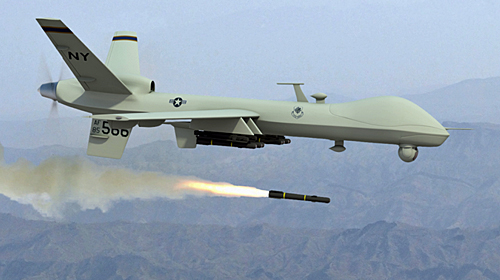Drone Strikes Filing Today: Appealing the CIA's Attempt to Hide the Worst-Kept Secret in the World


Today the РЯАФУХПЊНБНсЙћ filed its appeal brief in a Freedom of Information Act lawsuit seeking records about the CIA's use of drones to carry out targeted killings around the world. Like in our separate FOIA case seeking information about the legal and factual basis for the targeted killing of U.S. citizens, the CIA takes the position in this lawsuit that it can neither confirm nor deny whether it has a drone strike program at all. This is despite the fact that the Departments of Defense, State, and Justice all responded that they do in fact have documents on the program. As we told the court today, the CIA's position is simply untenable.
In speeches and statements to the press, numerous senior government officials, including and Defense Secretary (and former CIA Director) Leon Panetta, have repeatedly discussed the agency's use of drones to carry out targeted killings. Most recently, Attorney General Eric Holder publicly defended the government's authority to target and kill suspected terrorists, including U.S. citizens, far from any battlefield and without judicial oversight. Many news reports have also quoted unnamed officials discussing the drone program.
The broad power to kill claimed by the government requires informed public debate and judicial oversight. But, despite these extensive public disclosures, the government continues to tell the courts that its drone program is so secret it can't even admit to its existence. You can read the sworn statement from the CIA's representative here, in which she says, "An official CIA acknowledgment that confirms or denies the existence or nonexistence of records responsive to Plaintiffs' FOIA request would reveal, among other things, whether or not the CIA is involved in drone strikes or at least has an intelligence interest in drone strikes." (This is known as a .)
The CIA hides behind this response to avoid disclosing the legal standards it uses or basic facts about who can be targeted and why. The government thinks it can protect itself from scrutiny by simply calling its targeted killing program a "secret" in court. But the CIA's program isn't just the , it's no longer any secret at all, and the agency must say in court what it has already admitted in public.
Here's some of what we told the court today about why it should reject the government's claims:
[U]pholding the CIA's Glomar response here would serve only to harness the Court's institutional authority to a transparent fiction. Anyone who has followed the debate about the CIA's drone program knows that the program has been discussed on the record not only by the President and the then-CIA Director but by many other officials as well, and it is plain that any harm to the nation's security that would result from disclosure of the program has already been inflicted by the Agency itself.
Unsurprisingly, many commentators have already observed (and lamented) the increasing chasm between the categorical proposition the CIA advances in this litigationтthat the very existence of the Agency's drone program is a secretтand the numerous, detailed, and often self-serving statements the government has made about the program in other fora. The Glomar doctrine surely does not permit the government to play this kind of double game, still less to enlist the judiciary as a participant in it.
Learn more about targeted killings: Sign up for breaking news alerts, , and .

